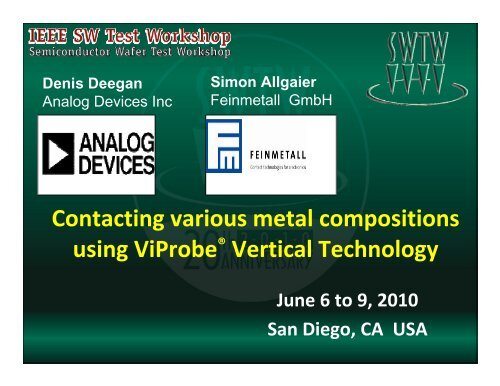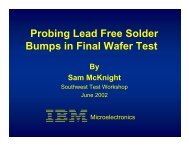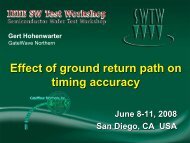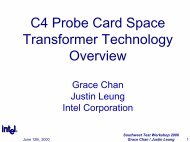Contacting various metal compositions using ViProbe® Vertical ...
Contacting various metal compositions using ViProbe® Vertical ...
Contacting various metal compositions using ViProbe® Vertical ...
Create successful ePaper yourself
Turn your PDF publications into a flip-book with our unique Google optimized e-Paper software.
Denis Deegan<br />
Analog Devices Inc<br />
Simon Allgaier<br />
Fein<strong>metal</strong>l GmbH<br />
<strong>Contacting</strong> <strong>various</strong> <strong>metal</strong> <strong>compositions</strong><br />
<strong>using</strong> ViProbe ® <strong>Vertical</strong> Technology<br />
June 6 to 9, 2010<br />
San Diego, CA USA
Content<br />
• Motivation.<br />
• ViProbe ® <strong>Vertical</strong> Probe Technology.<br />
• CRES Measurement setup.<br />
• Evaluation Results Al, Au, Cu Pad.<br />
• ViProbe ® Temperature Probe @ 200’C.<br />
• ViProbe ® ADC Testing in Probe to Data Sheet<br />
specifications.<br />
• Conclusions.<br />
• Future Work.<br />
June 6 to 9, 2010 IEEE SW Test Workshop 2
Motivation.<br />
ViProbe ® <strong>Vertical</strong> Probe Technology.<br />
CRES Measurement setup.<br />
Evaluation Results Al, Au, Cu Pad.<br />
ViProbe ® Temperature Probe @ 200’C.<br />
ViProbe ® ADC Testing in Probe to Data Sheet<br />
specifications.<br />
Conclusions.<br />
Future Work.<br />
June 6 to 9, 2010 IEEE SW Test Workshop 3
Motivation<br />
• Minimum pad deformation post sort required<br />
for,<br />
– Die shipping direct to customer (automotive).<br />
– FCOL (Flip Chip on Lead) Bumping process.<br />
– OPM (Over Pad Metallisation) Assembly process.<br />
• Multiple ‘contact pad’ <strong>metal</strong> <strong>compositions</strong>,<br />
– Al, Au, Cu.<br />
• Multi‐site Sort >8 sites / Grid Array Pattern.<br />
– EWLP (Embedded Wafer Level Package).<br />
• WLCSP (Minus bump).<br />
June 6 to 9, 2010 IEEE SW Test Workshop 4
Motivation (Cont.)<br />
• Temperature Sort of products used in,<br />
– Automotive,<br />
– Industrial applications.<br />
• KGD (Data Sheet Specifications) with any<br />
combinations of the above.<br />
• Increased requirement for <strong>Vertical</strong> Probe<br />
Technologies.<br />
– Minimum pad deformation, Stable CRES.<br />
June 6 to 9, 2010 IEEE SW Test Workshop 5
Motivation.<br />
ViProbe ® <strong>Vertical</strong> Probe Technology.<br />
CRES Measurement setup.<br />
Evaluation Results Al, Au, Cu Pad.<br />
ViProbe ® Temperature Probe @ 200’C.<br />
ViProbe ® ADC Testing in Probe to Data Sheet<br />
specifications.<br />
Conclusions.<br />
Future Work.<br />
June 6 to 9, 2010 IEEE SW Test Workshop 6
ViProbe ® <strong>Vertical</strong> Probe Technology.<br />
• Fein<strong>metal</strong>l ViProbe ® Wired Series<br />
• Same construction / needle tip for WLCSP, Al, Au, Cu Pad.<br />
June 6 to 9, 2010 IEEE SW Test Workshop 7
ViProbe ® <strong>Vertical</strong> Probe Technology.<br />
‘Cobra’ style Needle<br />
http://www.probepin.com/vertical_needles_e.aspx<br />
‘ViProbe ® Beam<br />
<br />
<br />
June 6 to 9, 2010 IEEE SW Test Workshop 8
ViProbe ® <strong>Vertical</strong> Probe Technology.<br />
•ViProbe ® a safer technology than Cantilever where probe<br />
mark area and scrub depth need to be controlled.<br />
June 6 to 9, 2010 IEEE SW Test Workshop 9
ViProbe ® Advantages<br />
• Mechanically robust and reliable.<br />
• Consistent probe mark signature across full<br />
array.<br />
• Easily repaired, minimum downtime.<br />
• Same ViProbe ® Beam used for contacting<br />
WLCSP Solder bump, Al / Au / Cu Pad.<br />
• ViProbe ® improvements (innovation<br />
development from Fein<strong>metal</strong>l) keeping pace<br />
with customer requirements.<br />
June 6 to 9, 2010 IEEE SW Test Workshop 10
Motivation.<br />
ViProbe ® <strong>Vertical</strong> Probe Technology.<br />
CRES Measurement setup.<br />
Evaluation Results Al, Au, Cu Pad.<br />
ViProbe ® Temperature Probe @ 200’C.<br />
ViProbe ® ADC Testing in Probe to Data Sheet<br />
specifications.<br />
Conclusions.<br />
Future Work.<br />
June 6 to 9, 2010 IEEE SW Test Workshop 11
CRES Measurement Setup.<br />
• Method 1: Measure CRES as part of Production Sort.<br />
Requirements<br />
– A pad large enough for a<br />
Kelvin contact (Force & Sense).<br />
– Preferably a supply pin.<br />
– PIB board design must include<br />
CRES measurement capability.<br />
– CRES = (Vm1 –Vm2) / Idd Kelvin needles<br />
Bond pad<br />
June 6 to 9, 2010 IEEE SW Test Workshop 12
CRES Measurement Setup.<br />
Method 2: “CRES Test Jig”<br />
• Offline CRES measurement.<br />
• “CRES Test Jig”<br />
– A 2 Needle Probe Card.<br />
– CRES PIB connected to DMM & VI.<br />
• Enables CRES experiments and<br />
capability to optimize Sort setup,<br />
debug yield hits.<br />
June 6 to 9, 2010<br />
Cantilever CRES probe card & scrub mark<br />
Needle Pitch = 30um<br />
IEEE SW Test Workshop 13
CRES Measurement Setup.<br />
• CRES Test Jig (ViProbe ® 2 Beam Probe Card)<br />
• 2 Mil Beams (Trivar HC ® pointed tip),<br />
• 75µM Pitch.<br />
June 6 to 9, 2010 IEEE SW Test Workshop 14
CRES Measurement Setup.<br />
• Experiment Steps (CRES Test Jig),<br />
1. Touchdown on Pad 1 on Die 1,<br />
2. Measure CRES with DMM (1mA),<br />
3. Force current (i = 30mA),<br />
4. Measure CRES with DMM (1mA),<br />
5. Index to Pad 1 next die,<br />
• Probe Pad 1 all Die,<br />
• Re-probe at Pad 1 with X,Y, offset,<br />
Or change to Pad 2<br />
June 6 to 9, 2010 IEEE SW Test Workshop 15
Motivation.<br />
ViProbe ® <strong>Vertical</strong> Probe Technology.<br />
CRES Measurement setup.<br />
Evaluation Results Al, Au, Cu Pad.<br />
ViProbe ® Temperature Probe @ 200’C.<br />
ViProbe ® ADC Testing in Probe to Data Sheet<br />
specifications.<br />
Conclusions.<br />
Future Work.<br />
June 6 to 9, 2010 IEEE SW Test Workshop 16
Evaluation Results Al, Au, Cu Pad.<br />
• Post Sort with ViProbe ® <strong>Vertical</strong><br />
Technology,<br />
Measurements / Analysis from,<br />
(1) 2D Probe Mark inspection (Leica Microscope),<br />
(2) 2D Probe Mark inspection (NSX 105),<br />
(3) 3D Probe Mark inspection (Zygo Profilometer),<br />
(4) CRES.<br />
NOTE:<br />
(1) to (3) above PMI measurements taken after Sort with<br />
full ViProbe ® Production Probe Cards.<br />
(4) Using CRES JIG <strong>using</strong> ViProbe ® 2 Beam Probe Card.<br />
June 6 to 9, 2010 IEEE SW Test Workshop 17
ViProbe ® on Al Pad.<br />
• Flip Chip on Lead (FCOL) requires Sort before<br />
bumping.<br />
– Electroplated bump process requires smallest<br />
possible probe mark.<br />
– ViProbe ® was qualified to probe Al Pad (FCOL<br />
parts) before electroplated bump process.<br />
Flip Chip On Leadframe<br />
June 6 to 9, 2010 IEEE SW Test Workshop 18
ViProbe ® on Al Pad.<br />
• Automotive KGD, 3 Temperature pass<br />
(Ambient, ‐40’C, +160’C).<br />
• Critical Quality parameters,<br />
– Probe Mark Size,<br />
– No Pad edge incursions.<br />
June 6 to 9, 2010 IEEE SW Test Workshop 19
ViProbe ® on Al Pad.<br />
• Al Pad deformation post Cantilever Sort.<br />
– Zygo Profilometer (2007 Data).<br />
– Typical Scrub depth 0.8µM.<br />
1µM<br />
Depth<br />
0<br />
-0.2<br />
-0.4<br />
-0.6<br />
-0.8.<br />
-1<br />
A B C D E F G H<br />
Bond Pad<br />
June 6 to 9, 2010 IEEE SW Test Workshop 20
ViProbe ® on Al Pad.<br />
• Zygo Profilometer.<br />
• Depth of Cantilever on Al Pad = 0.7µM.<br />
June 6 to 9, 2010 IEEE SW Test Workshop 21
ViProbe ® on Al Pad.<br />
ViProbe ® Probe Marks post 3 pass Sort.<br />
3 Cantilever Probe Scrubs breaking Pad Edge<br />
June 6 to 9, 2010 IEEE SW Test Workshop 22
ViProbe ® on Al Pad.<br />
Pass 1 Pass 2 Pass 3<br />
• NSX 105 post Pass 3<br />
– Probe Mark Area = 546µM 2 ,<br />
– Probe Mark % of Pad = 3.8%<br />
– Pad Edge Proximity = 35µM.<br />
June 6 to 9, 2010 IEEE SW Test Workshop 23
ViProbe ® on Al Pad.<br />
• Zygo Profilometer.<br />
• Depth of ViProbe ® Scrub on Al Pad post Pass 3,<br />
– Probe Mark Depth = 0.6µM<br />
June 6 to 9, 2010 IEEE SW Test Workshop 24
ViProbe ® on Al Pad.<br />
• CRES baseline 0.6 Ohm, CRES stable over temperature<br />
Resistance (ohms)<br />
150’C CRES = 0.83 (Mean + 3 σ)<br />
25’C CRES = 0.81 (Mean + 3 σ)<br />
Samples<br />
June 6 to 9, 2010 IEEE SW Test Workshop 25
ViProbe ® on Au Pad.<br />
• EWLP – Embedded Wafer Level Package.<br />
•WLCSP (Minus Bump)<br />
PI1<br />
RDL<br />
(TiW/Cu) PI2<br />
UBM<br />
(Ti-Cu/Ni/Au)<br />
Fab<br />
Passivation<br />
Al pad<br />
Al pad<br />
205µm<br />
170µm<br />
~3.5µm<br />
•SEM of UBM Pad<br />
June 6 to 9, 2010 IEEE SW Test Workshop 26
ViProbe ® on Au Pad.<br />
• EWLP –Au Pad of ~1µM Au Flash,<br />
• Post Sort Requirement: No Punch Thru.<br />
~1µm layer of Gold<br />
Nickel<br />
Titanium<br />
Copper<br />
June 6 to 9, 2010 IEEE SW Test Workshop 27
ViProbe ® on Au Pad.<br />
• 2D PMI (Leica microscope),<br />
• Scrub Mark area ~400µM 2 .<br />
– ViProbe ® Kelvin at 86µM pitch.<br />
June 6 to 9, 2010 IEEE SW Test Workshop 28
ViProbe ® on Au Pad.<br />
• 3D PMI (Zygo Profilometer).<br />
• Depth of ViProbe ® Scrub on Au Pad = 0.185µM<br />
June 6 to 9, 2010 IEEE SW Test Workshop 29
ViProbe ® on Au Pad.<br />
• CRES at 125’C, No Online Clean required.<br />
CRES = 0.52 Ohm (Mean + 3 σ)<br />
June 6 to 9, 2010 IEEE SW Test Workshop 30
ViProbe ® on Cu Pad.<br />
• Cu RDL + Cu Pad.<br />
• Concern was oxidation and the resulting<br />
difficulty of making good electrical contact.<br />
Polyimide<br />
~3um Cu RDL<br />
Copper RDL<br />
Bond Pad<br />
Passivation<br />
Silicon<br />
Bare Copper Pad<br />
7.5um Min thicknes<br />
June 6 to 9, 2010 IEEE SW Test Workshop 31
ViProbe ® on Cu Pad.<br />
• 2D PMI (Leica microscope).<br />
– Single and Kelvin Probe Marks.<br />
June 6 to 9, 2010 IEEE SW Test Workshop 32
ViProbe ® on Cu Pad.<br />
• 3D PMI (Zygo Profilometer).<br />
– Noisy result for a single touchdown,<br />
– ~0.360µM depth.<br />
June 6 to 9, 2010 IEEE SW Test Workshop 33
ViProbe ® on Cu Pad.<br />
• 3D PMI (Zygo Profilometer).<br />
– x10 touchdown (flattening effect from re‐probe),<br />
– 0.266µM depth.<br />
June 6 to 9, 2010 IEEE SW Test Workshop 34
ViProbe ® on Cu Pad.<br />
• Measure CRES, Force 30mA, Measure CRES.<br />
– Fritting has a slight improvement on unstable CRES.<br />
June 6 to 9, 2010 IEEE SW Test Workshop 35
ViProbe ® on Cu Pad.<br />
• Online Clean (ITS Probe Polish, every 1K Tds).<br />
– Stable CRES to 9,000 Tds, Need to improve?<br />
June 6 to 9, 2010 IEEE SW Test Workshop 36
ViProbe ® on Cu Pad.<br />
• Online Clean (ITS Probe Polish, every 1K Tds).<br />
– Cu CRES = 0.53 (Mean + 3 σ) to 9K Tds.<br />
June 6 to 9, 2010 IEEE SW Test Workshop 37
ViProbe ® on Cu Pad.<br />
• Cu at 125’C (setup verification at Ambient to 1K Tds).<br />
– Cu CRES unstable from ~3K Tds at temperature.<br />
June 6 to 9, 2010 IEEE SW Test Workshop 38
ViProbe ® on Cu Pad.<br />
• Cu CRES Summary:<br />
– At ambient temperature, CRES stable to 9K Tds,<br />
– But online Clean needed.<br />
– Many hours on Sort floor trying to extend CRES<br />
stability above 9K Tds,<br />
– No definite solution<br />
– ViProbe ® Technology good, Cu Challenging.<br />
– Long Term solution is to work with ITS and Fein<strong>metal</strong>l<br />
to find optimum online Clean recipe.<br />
June 6 to 9, 2010 IEEE SW Test Workshop 39
Motivation.<br />
ViProbe ® <strong>Vertical</strong> Probe Technology.<br />
CRES Measurement setup.<br />
Evaluation Results Al, Au, Cu Pad.<br />
ViProbe ® Temperature Probe @<br />
200’C.<br />
ViProbe ® ADC Testing in Probe to Data<br />
Sheet specifications.<br />
Conclusions.<br />
Future Work.<br />
June 6 to 9, 2010 IEEE SW Test Workshop 40
ViProbe ® Temperature Probe 160‘C.<br />
• 3 Pass Automotive Probe Card.<br />
• Fein<strong>metal</strong>l specification 150’C, used at 160’C.<br />
• ADI requirement for >160’C capability.<br />
June 6 to 9, 2010 IEEE SW Test Workshop 41
ViProbe ® Temperature Probe 200‘C.<br />
• Use existing automotive solution as test vehicle<br />
for measuring Max temperature capability.<br />
• Evaluation involved testing product with +5’C<br />
increments in temperature.<br />
• Existing solution worked to 170’C, at 175’C<br />
open circuit failures,<br />
– But Probe Marks still centre of Pad?<br />
June 6 to 9, 2010 IEEE SW Test Workshop 42
ViProbe ® Temperature Probe 200‘C.<br />
• SchaeferBoehm et al SWTW paper 2009.<br />
• Probe Head to Connector contact point issue.<br />
June 6 to 9, 2010 IEEE SW Test Workshop 43
ViProbe ® Temperature Probe 200‘C.<br />
• 200’C W41 ViProbe ® Probe Card (No O/C Fails).<br />
– Using higher temperature specification materials.<br />
– >200’C possible with ‘Heat Shield’ and higher Tg PCB.<br />
June 6 to 9, 2010 IEEE SW Test Workshop 44
Motivation.<br />
ViProbe ® <strong>Vertical</strong> Probe Technology.<br />
CRES Measurement setup.<br />
Evaluation Results Al, Au, Cu Pad.<br />
ViProbe ® Temperature Probe @ 200’C.<br />
ViProbe ® ADC Testing in Probe to Data<br />
Sheet specifications.<br />
Conclusions.<br />
Future Work.<br />
June 6 to 9, 2010 IEEE SW Test Workshop 45
ViProbe ® ADC Testing in Probe to Data<br />
Sheet Specifications.<br />
• Objective: Can KGD be provided at Probe for a 210MSPS<br />
ADC (Product A) and similar high speed converters.<br />
• Use Product A performance results (INL/DNL, and SNR) as<br />
an indication of the influences of the ‘Probe Card’ on the<br />
signal paths and decoupling.<br />
–Existing KGD High Performance Cantilever solutions<br />
already available.<br />
– Need a <strong>Vertical</strong> Technology KGD capability.<br />
June 6 to 9, 2010 IEEE SW Test Workshop 46
ViProbe ® ADC Testing in Probe to Data<br />
Sheet Specifications.<br />
• Low Inductance decoupling.<br />
• 50 Ohm impedance as close to DUT as possible.<br />
June 6 to 9, 2010 IEEE SW Test Workshop 47
ViProbe ® ADC Testing in Probe to Data<br />
Sheet Specifications.<br />
• ViProbe ® Solution.<br />
–Direct Attach ViProbe ® Probe Card with custom PCB<br />
(all signal conditioning components on PCB).<br />
–PCB layout based on working Cantilever solutions.<br />
–ADI supplied PCB, Direct Attach ViProbe ® Head<br />
from Fein<strong>metal</strong>l.<br />
• Results: Are for INL/DNL, SNR (10.3 & 70MHz) for<br />
–Data sheet spec,<br />
–A Final test part tested on the same tester,<br />
– ViProbe ® Direct Attach solution.<br />
June 6 to 9, 2010 IEEE SW Test Workshop 48
ViProbe ® ADC Testing in Probe to Data<br />
Sheet Specifications.<br />
• INL Results.<br />
• Final test program limit:<br />
– INLn: ‐1.5lsb to 0.0lsb<br />
– INLp: 0.0lsb to 1.5lsb<br />
– No missing codes<br />
Sample Device FT board<br />
INLn = -0.405lsb<br />
INLp = 0.446lsb<br />
INLn = -0.248lsb<br />
INLp = 0.214sb<br />
June 6 to 9, 2010 IEEE SW Test Workshop 49
ViProbe ® ADC Testing in Probe to Data<br />
Sheet Specifications.<br />
• DNL Results.<br />
• Final test program limit:<br />
– DNLn: ‐0.850lsb to 0.0lsb<br />
– DNLp: 0.0lsb to 0.850lsb<br />
Sample Device FT board<br />
DNLn = -0.328lsb<br />
DNLp = 0.162lsb<br />
DNLn = -0.202lsb<br />
DNLp = 0.178lsb<br />
June 6 to 9, 2010 IEEE SW Test Workshop 50
ViProbe ® ADC Testing in Probe to Data<br />
Sheet Specifications.<br />
• SNR / SINAD Results.<br />
• Final test limit (Fin = 10.3<br />
MHz):<br />
– SNR: 62.9dB<br />
– SINAD: 62.9dB<br />
– H2: ‐75dB<br />
– H3: ‐75dB<br />
Sample Device FT board<br />
10.3MHz<br />
H2<br />
SNR = 64.3dB<br />
SINAD = 64.2dB<br />
H2 = -83.3dB<br />
H3 = -89.1dB<br />
H3<br />
10.3MHz<br />
H2 H3<br />
SNR = 64.7dB<br />
SINAD = 64.6dB<br />
H2 = -81.6dB<br />
H3 = -93.6dB<br />
June 6 to 9, 2010 IEEE SW Test Workshop 51
ViProbe ® ADC Testing in Probe to Data<br />
Sheet Specifications.<br />
• SNR / SINAD Results.<br />
• Final test limit (Fin = 70 MHz):<br />
– SNR: 62.9dB<br />
– SINAD: 62.9dB<br />
– H2: ‐75dB<br />
– H3: ‐75dB<br />
Sample Device FT board<br />
70MHz<br />
June 6 to 9, 2010<br />
SNR = 63.2dB<br />
SINAD = 63.2dB<br />
H2 = -89.6dB<br />
H3 = -85.4dB<br />
H2 H3<br />
70MHz<br />
H2<br />
SNR = 63.5dB<br />
SINAD = 62.8dB<br />
H2 = -70.9dB<br />
H3 = -91.0dB<br />
H3<br />
IEEE SW Test Workshop 52
Conclusions.<br />
• ViProbe ® used successfully to Sort multiple Pad<br />
Compositions Al, Au, and Cu.<br />
• Presented Post ViProbe ® data for Al, Au, and Cu.<br />
– Meets required minimum pad deformation,<br />
– Meets stringent automotive quality requirements.<br />
– Technology suitable for Au flash OPM applications.<br />
–Stable CRES (Online Clean needed for Cu).<br />
• W41 ViProbe ® enables >200’C Sort.<br />
• KGD High Speed Converter testing (at Sort) is possible<br />
<strong>using</strong> ViProbe ® Direct Attach.<br />
June 6 to 9, 2010 IEEE SW Test Workshop 53
Future Work.<br />
• Work with ITS and Fein<strong>metal</strong>l to find optimum online<br />
clean recipe (Required for Cu Pad).<br />
• Evaluate bandwidth capabilities of ViProbe ® Direct<br />
Attach.<br />
• Investigate high temperature >200’C and influence of<br />
prober limitations.<br />
• Further Over Pad Metallization (OPM) evaluations Au<br />
flash < 1µM.<br />
June 6 to 9, 2010 IEEE SW Test Workshop 54
Acknowledgements.<br />
• Analog Devices Limerick;<br />
•John Halley,<br />
• Mike Kennedy, Dan Sheehan, Seamus Sweeney, John Paul<br />
Whelan, Jason Howard, Marion O‘ Sullivan.<br />
• Fein<strong>metal</strong>l GmbH;<br />
•Simon Allgaier,<br />
• Tim Hilbert, Lothar Strom, Helmut Seefeldt.<br />
• IEEE SW Test Workshop;<br />
• Everyone who contributes their time to make this event<br />
happen.<br />
June 6 to 9, 2010 IEEE SW Test Workshop 55
Thank You.<br />
Questions?<br />
June 6 to 9, 2010 IEEE SW Test Workshop 56









